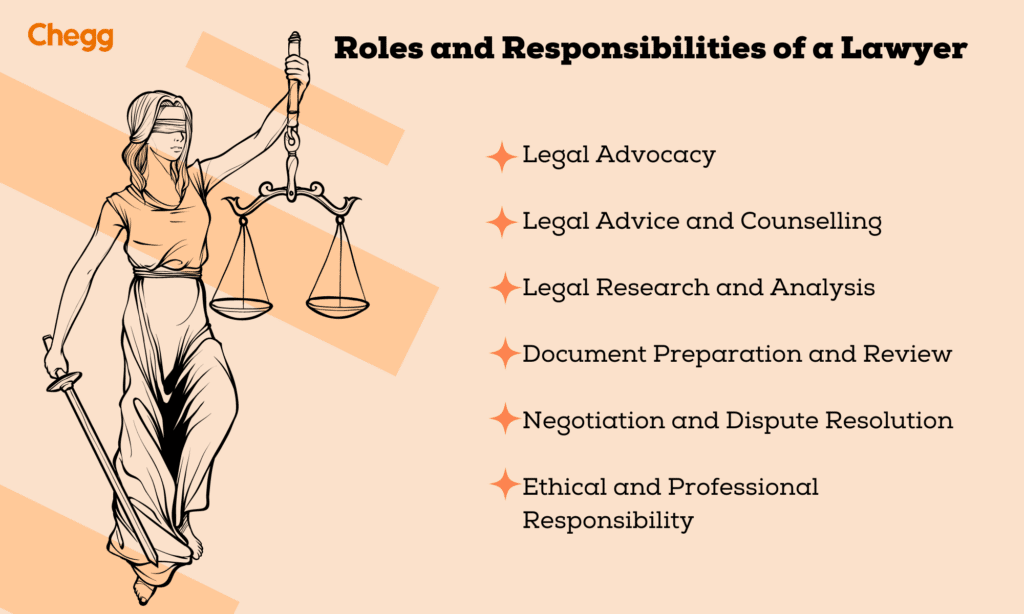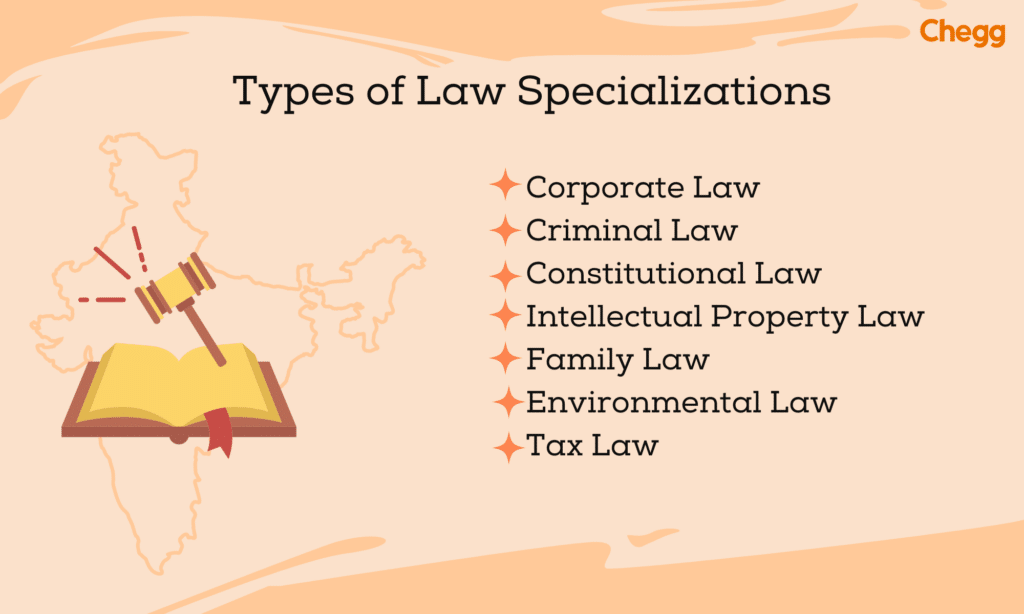

Quick Summary
- Detailed overview of the academic requirements to become a lawyer in India, including the necessary degrees (LL.B., LL.M.), entrance exams (CLAT, AILET), and top law schools to consider in 2024.
- Professional Training and Licensing: Internships, apprenticeships, and bar council registration.
- Career Opportunities and Specializations: Various legal career paths and tips for success.
Table of Contents
Have you ever wondered how to become a lawyer in India?
According to recent statistics, the legal profession in India is thriving, with over 1.4 million registered lawyers nationwide. If you have a passion for justice and a desire to advocate for others, the legal profession might be the perfect fit for you.
In this comprehensive guide, we will not only provide you with valuable information on how to become a lawyer in India, but also delve into the intricacies of pursuing an LLB after graduation, navigating law exams, and exploring the diverse career prospects that await you after completing your degree.
Join us as we navigate the fascinating world of the legal field and unveil the steps to embark on a successful legal career in India. Whether you’re seeking insights into the qualifications required, the top law colleges, or the various specializations available, we have all the answers you need to unleash your potential in the dynamic field of law.
Some Quick Facts About Becoming a Lawyer in India?
|
Industry type |
Law, Legal Profession |
|
Eligibility Criteria |
10+2 (any stream) with a minimum of 60% aggregate marks |
|
Qualify law entrance exams |
Common Law Admission Test (CLAT), All India Law Entrance Test (AILET), and other state-level exams |
|
Admission Process |
Based on merit and performance in law entrance exams |
|
Specializations |
Civil, Criminal, Corporate, Tax, Intellectual Property, Family Law, Environmental Law, and more |
|
Average Starting Salary |
INR 4-6 lakhs per annum |
|
Highest Salary |
INR 80 lakhs to 1 crore per annum |
|
Job Opportunities |
Lawyer, Judge, Legal Advisor, Corporate Lawyer, Criminal Lawyer, Family Lawyer, and more |
Who is a Lawyer?
Lawyers are legal professionals trained and licensed to provide advice and representation in legal matters. Beyond their courtroom appearances, lawyers play a vital role in upholding justice, protecting rights, and ensuring compliance with the law. They possess in-depth knowledge of legal principles and procedures, enabling them to guide clients through complex legal processes and provide expert advice.
Advocacy is a central aspect of a lawyer’s work. They act as champions for their clients, working tirelessly to protect their rights and ensure fair treatment under the law. Lawyers also contribute to the development of legal precedents and the interpretation of laws through their legal analysis and arguments.
By fulfilling these responsibilities, lawyers help resolve conflicts, provide legal guidance, and maintain the integrity of the legal system. Their expertise and dedication to justice make them indispensable in safeguarding the rights and liberties of individuals, organizations, and entities.
Also Read: Difference Between Lawyer and Advocate

How to Become a Lawyer in India: Stepwise Process
Earn a Bachelor’s Degree
Complete your undergraduate education and earn a bachelor’s degree in any discipline. There is no specific undergraduate major required to pursue law, so choose a field that interests you.
Clear Law Entrance Exams
To get admission to a law school in India, you need to qualify for law entrance exams such as the Common Law Admission Test (CLAT), All India Law Entrance Test (AILET), or other state-level entrance exams. These exams assess your aptitude in areas like English, general knowledge, logical reasoning, and legal aptitude.
Pursue a Law Degree (LLB)
After clearing the entrance exams, enrol in a recognized law school to pursue a Bachelor of Laws (LLB) degree. The LLB program typically lasts for three years. Alternatively, you can opt for a five-year integrated BA LLB or BBA LLB program directly after completing 10+2.
Gain Practical Experience
While pursuing your LLB, try to gain practical experience through internships at law firms, legal clinics, or with practicing lawyers. Practical exposure will enhance your understanding of legal concepts and provide valuable insights into the profession.
Clear Bar Council Examination
After completing your LLB, you need to clear the Bar Council Examination conducted by the respective state’s Bar Council. This examination tests your knowledge of procedural laws, substantive laws, and legal ethics.
Enrol as an Advocate
Once you pass the Bar Council Examination, you can enrol as an advocate with the Bar Council of your state or the Bar Council of India. This step grants you the license to practice law as a professional advocate.
Choose a Specialization (Optional)
After enrolment, you can choose to specialize in a specific area of law by pursuing a master’s degree (LLM) in that field. Specializations can include criminal law, corporate law, intellectual property law, or any other area of interest.
Gain Professional Experience
Build your experience by working as an associate with law firms, government agencies, corporate legal departments, or under senior advocates. This practical experience will refine your skills, expand your network, and enhance your professional growth.
Continuous Learning and Professional Development
Stay updated with the latest legal developments, attend seminars, participate in workshops, and engage in continuous learning to enhance your knowledge and skills. Join professional associations and networks to stay connected with the legal community.
Qualifications to Become a Lawyer in India
To become a lawyer in India, several qualifications and educational pathways are available. Here are the key qualifications:
Bachelor of Law (LLB)
- LLB is the primary qualification for aspiring lawyers in India.
- Duration: 3 years for graduates, 5 years after 12th grade.
- LLB curriculum covers subjects like Constitutional Law, Criminal Law, Civil Law, and Corporate Law.
- Admission process: Entrance exams like CLAT, state-level exams.
- Eligibility criteria: Minimum educational qualification and age limit.
Integrated BA LLB
- Integrated program combining undergraduate studies with legal education.
- Duration: 5 years.
- Offers a comprehensive understanding of law from the beginning.
- Subjects include Political Science, Sociology, Economics, alongside core legal subjects.
- Admission process: Entrance exams.
- Eligibility criteria: Specific requirements set by colleges.
Latin Legum Magister (LLM)
- Postgraduate program for law graduates to specialize in a specific area of law.
- Provides advanced legal knowledge and research skills.
- Duration and admission process vary among universities.
- Requires prior LLB degree from a recognized university.
- Offers opportunities for career advancement in academia, law firms, or international organizations.
Recommended Read: All You Need to Know about LLM Course in India
By pursuing an LLB or integrated BA LLB program, individuals can acquire the foundational legal education required to become a lawyer in India. Those seeking specialization can pursue an LLM degree to deepen their expertise. Each qualification pathway has its own duration, admission process, and eligibility criteria. Choosing the right qualification depends on individual preferences and career goals.

Entrance Exams to Become a Lawyer in India
Common Law Admission Test (CLAT):
- Sections: English, General Knowledge and Current Affairs, Elementary Mathematics, Legal Aptitude, and Logical Reasoning.
- Total Questions: Approximately 150-200 questions.
- Duration: 2 hours.
- Marking Scheme: Each correct answer carries 1 mark, and there is a negative marking of 0.25 marks for each wrong answer.
All India Law Entrance Test (AILET):
- Sections: English, General Knowledge, Legal Aptitude, Reasoning, and Elementary Mathematics (up to Class 10 level).
- Total Questions: Around 150 questions.
- Duration: 1 hour 30 minutes.
- Marking Scheme: Each correct answer carries 1 mark, and there is no negative marking.
Law School Admission Test (LSAT):
- Sections: Reading Comprehension, Analytical Reasoning, and Logical Reasoning.
- Total Questions: 92-100 questions.
- Duration: 2 hours 20 minutes.
- Marking Scheme: There is no negative marking, and the test is scored on a scale of 120-180.
Note: It’s important to note that the sections, number of questions, duration, and marking scheme may be subject to change as per the respective exam conducting authorities. It is advisable to refer to the official websites and notifications of the exams for the most accurate and up-to-date information.
Top Law Colleges in India
|
Law College |
Fees (Approx.) |
Duration |
Rankings |
Courses Offered |
|
National Law School of India University |
₹1,60,000/year |
5 years |
Rank 1 (NIRF) |
BA LLB, LLM, PhD |
|
National Law University, Delhi |
₹2,15,000/year |
5 years |
Rank 2 (NIRF) |
BA LLB, LLM, PhD |
|
NALSAR University of Law |
₹1,70,000/year |
5 years |
Rank 3 (NIRF) |
BA LLB, LLM, PhD |
|
Symbiosis Law School |
₹2,25,000/year |
5 years |
Rank 8 (NIRF) |
BA LLB, BBA LLB, LLM, PhD |
|
Jindal Global Law School |
₹5,25,000/year |
5 years |
Rank 9 (NIRF) |
BA LLB, BBA LLB, LLM, PhD |
|
Gujarat National Law University |
₹2,75,000/year |
5 years |
Rank 12 (NIRF) |
BA LLB, BCom LLB, BSc LLB, LLM, PhD |
|
National Law Institute University, Bhopal |
₹2,45,000/year |
5 years |
Rank 14 (NIRF) |
BA LLB, LLM, PhD |
|
West Bengal National University of Juridical Sciences |
₹1,80,000/year |
5 years |
Rank 15 (NIRF) |
BA LLB, BSc LLB, LLM, PhD |
|
National Law University, Jodhpur |
₹1,66,000/year |
5 years |
– |
BA LLB, BBA LLB, LLM, PhD |
|
Rajiv Gandhi National University of Law |
₹2,10,000/year |
5 years |
– |
BA LLB, BCom LLB, BSc LLB, LLM, PhD |
|
Dr. Ram Manohar Lohiya National Law University |
₹1,55,000/year |
5 years |
– |
BA LLB, BSc LLB, LLM, PhD |
|
National University of Advanced Legal Studies |
₹1,90,000/year |
5 years |
– |
BA LLB, BCom LLB, BBA LLB, LLM, PhD |
|
National Law University and Judicial Academy, Assam |
₹1,20,000/year |
5 years |
– |
BA LLB, BSc LLB, LLM, PhD |
|
Hidayatullah National Law University |
₹2,30,000/year |
5 years |
– |
BA LLB, LLM, PhD |
|
National Law University, Odisha |
₹2,20,000/year |
5 years |
– |
BA LLB, LLM, PhD |
Note: Please note that the fees mentioned are approximate and subject to change. Rankings may vary depending on the publication or ranking system used. It’s always recommended to visit the official websites of the respective law colleges for the most accurate and up-to-date information regarding fees, duration, rankings, and courses offered.

Eligibility Criteria for Admission to Become a Lawyer
- Academic Qualification: Pass the 12th exams with a minimum of 60% aggregate score or equivalent CGPA.
- Law Entrance Exams: Clear national and university-level law entrance exams such as CLAT, LSAT, AILET, or other specified exams.
- Pursue a Law Degree: Acquire an undergraduate or integrated law degree, such as LLB, BA LLB, BBA LLB, BSc LLB, or BCom LLB, from a recognized institution.
- Optional: Candidates who hold an LLM (Master of Laws) degree can also become a lawyer.
Diverse Career Prospects for Lawyers in India
|
Career Prospects |
Job Roles and Responsibilities |
Average Annual Salary (in INR) |
|
Corporate Lawyer |
Legal advice, contracts, mergers and acquisitions |
6-10 lakhs |
|
Litigation Lawyer |
Representing clients in courts, legal research |
3-8 lakhs |
|
Criminal Lawyer |
Defending accused, investigations, trial representation |
4-9 lakhs |
|
Intellectual Property (IP) Lawyer |
IP advice, filings, infringement cases |
5-12 lakhs |
|
Family Lawyer |
Family legal matters, divorce, child custody |
3-7 lakhs |
Please note that the salary ranges provided are approximate and can vary depending on factors such as experience, location, and organization. Read more about the Salary of Corporate Lawyers in India.
Recommended Read: How to Become a Judge in India
Concluding Remarks on Pursuing a Legal Career
In conclusion, this comprehensive guide has shed light on the process of becoming a lawyer in India. It has covered the essential steps, including eligibility criteria, clearing entrance exams, pursuing a law degree, gaining practical experience, and enrolling with the Bar Council. By following this step-by-step approach, individuals can embark on a successful legal career.
Additionally, the guide has highlighted the diverse career prospects available in the legal field, including roles such as corporate lawyer, litigation lawyer, criminal lawyer, intellectual property lawyer, and family lawyer. With dedication and continuous learning, aspiring lawyers can make a positive impact in the legal profession and society as a whole.
Unleash your legal career potential with our comprehensive Career Advice section, thoughtfully curated to provide valuable insights and guidance for aspiring lawyers in India.
Frequently Asked Questions
How long does it take to become a lawyer?
To embark on a career as a lawyer, it typically takes around 5-8 years to become fully qualified. This includes completing higher education, obtaining a graduation degree, and pursuing an LLB. If you opt for a 10+2 route, you can pursue a 5-year integrated LLB program.
What are the qualifications required to become a lawyer?
To become a lawyer, you must follow certain steps. You need to complete your higher secondary education and then choose between pursuing a 3-year LLB after graduation or enrolling in a 5-year integrated program. Both options require clearing an entrance exam.
How can I start my legal profession after 12th?
If you aspire to start your legal career right after the 12th grade, you should prepare for law entrance exams such as CLAT, LSAT, SET, etc. Based on your entrance exam scores, you can secure admission to law schools offering integrated programs like BA LLB, B. Com LLB, or LLB.
Is studying law challenging?
Studying law requires dedication and hard work. While it may pose challenges, if you have a genuine interest in becoming a lawyer and a passion for helping others, the journey becomes worthwhile. You will need to delve into subjects like law, penal codes, and the constitution, but the reward of achieving your goal makes it all worthwhile.
To read more related articles, click here.
Got a question on this topic?